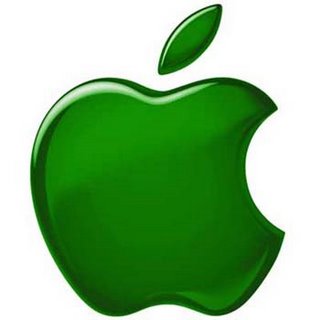 Greenpeace, the well-known environmental organization that speaks out against nuclear power and climate change, has revised its “Guide to Greener Electronics,” a ranking of 18 major electronics companies based on how eco-friendly they are in their practices. While it didn’t top the list, Apple came out the big winner, jumping 4 places higher on the list to fifth place — that’s 11 places higher than Microsoft, which bottomed out the ranks, beating only Nintendo.
Greenpeace, the well-known environmental organization that speaks out against nuclear power and climate change, has revised its “Guide to Greener Electronics,” a ranking of 18 major electronics companies based on how eco-friendly they are in their practices. While it didn’t top the list, Apple came out the big winner, jumping 4 places higher on the list to fifth place — that’s 11 places higher than Microsoft, which bottomed out the ranks, beating only Nintendo.
Taking factors into account like use of toxic chemicals, recycling, energy use and operational cleanliness into account, the Greenpeace guide celebrates Nokia and Sony Ericsson as the top two greenest company in the business. This is good news for Sony, which scored the highest out of any gaming console maker while its peers performed miserably.
Apple was able to up its score by eliminating toxic polyvinyl chlorides (PVCs) and brominated flame retardants (BFRs) from its products and packaging — that earned it big points. It also lobbied the European Union to pass restriction on these and other types of hazardous substances used in especially plastic consumer products. It lost a couple points for not being more transparent about its supply chain. All in all though, this is pretty good news for the company, considering how hard it has worked to buoy its green image in the past year. Not only did it withdraw from the U.S. Chamber of Commerce over its unwillingness to support carbon emissions legislation, it also launched its Apple and the Environment site detailing its efforts to be more eco-conscious.
Microsoft, on the other hand, actually lost points this time around for opposing legislation limiting toxic chemicals used in its products. It fell to 17th place from 15th since the last guide revision was released. Nintendo also got dinged for the same reasons, bringing up the rear yet again, as it has since console makers were first introduced to the list in 2007. Dell (14th place) and Lenovo (16th place) also got scored down for use of toxic substances.
Another notable placement on the list is Panasonic, lodged right in the middle at 10th place, which earned points for being more energy efficient than mosto f its competitors, but still got a bad rap for producing more e-waste and not recycling as much as it could. Look for Panasonic to work its way up the list as it becomes increasingly interested in green. Not only has it made deals to produce batteries for zero-emissions vehicles, it is looking into home and grid-scale energy storage systems that could drastically cut greenhouse gas emissions in the future. It just need to internalize these values.
While Greenpeace has been marginalized to some extent as a more radical organization, like PETA, it’s still pretty informative about how and why electronics companies are approaching environmental measures. It’s unlikely that the list will make a huge impact on revenue or consumer decision making, but hopefully it will encourage the companies that are already on the right track, like Apple, Toshiba and Philips, to keep up the good work.
http://www.greenpeace.org/international/assets/binaries/ranking-guide-14th-edition.swf

